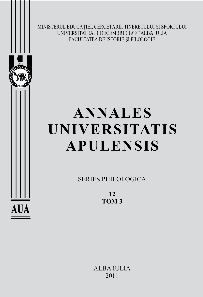Manifestări ale discursului identitar în Republica Moldova (Abordare sociolingvistică)
Manifestations of Identity Discourse in the Republic of Moldova (Sociolinguistic Approach)
Author(s): Lilia CazacuSubject(s): Language and Literature Studies
Published by: Universitatea »1 Decembrie 1918« Alba Iulia
Keywords: sociolinguistic; identity discourse; interethnic communication; Romanian language; linguistic contacts; language policy; the Republic of Moldova
Summary/Abstract: Abstract: To discuss about identity discourse it shows us that it’s still an exciting, controversial and present-day topic. Discussions around this topic are generated by the return of the Republic of Moldova on the Europe’s political scene, after nearly a half of century of obscurity in the Soviet Union. Ambiguous linguistic policy which was adopted after 1990, by the Republic of Moldova, the strained interethnic relationship, the long time linguistic contacts between Romanian and Russian languages are social phenomenon that have caused the split of society in two categories, each of them adopting one of the two identity discourses: Moldavian or Romanian. The actuality of our study is ensured by the particular identity situation from the Republic Moldova. The theory of the existence of two languages (Romanian and Moldavian), using the name of Moldavian language, the existence of two opposing identity discourses in the same geographical area and the strong policy influence on these social issues, arouse the interest of specialists in the field of sociolinguistic. Although the question of identity is also present in other countries, this problem takes new dimensions in Eastern Europe area and the Republic of Moldova is a specific case. The various manifestations of identity, whether we are speaking about Moldavian or Romanian discourse, are expressed through public discourse of intellectuals, politicians and ordinary citizens. Often, the politicians and intellectuals discourse is known by the general public. Therefore, in our paper we will focus mainly on the identity manifestations of the ordinary citizens, expressed through panels, inscriptions or through various other ways of expression. First we will follow up to highlight how the individuals are related to their own identity and the identity of others. Also, using specific examples we will try to evoke the role of certain problems in solving the identity crisis from Republic of Moldova such as interethnic dialogue, problem of the official language name and language policy of the state.
Journal: Annales Universitatis Apulensis. Series Philologica
- Issue Year: 12/2011
- Issue No: 3
- Page Range: 119-133
- Page Count: 14
- Language: Romanian

